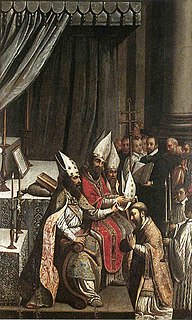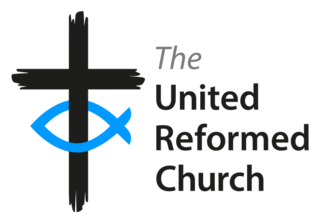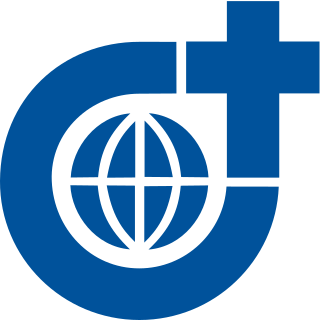
Apostolic succession is the method whereby the ministry of the Christian Church is held to be derived from the apostles by a continuous succession, which has usually been associated with a claim that the succession is through a series of bishops. Christians of the Roman Catholic, Eastern Orthodox, Oriental Orthodox, Old Catholic, Hussite, Anglican, Church of the East, Moravian, and Scandinavian Lutheran traditions maintain that "a bishop cannot have regular or valid orders unless he has been consecrated in this apostolic succession." Each of these groups does not necessarily consider consecration of the other groups as valid.
A bishop is an ordained, consecrated, or appointed member of the Christian clergy who is generally entrusted with a position of authority and oversight.

In certain Christian churches, holy orders are the ordained ministries of bishop, priest (presbyter), and deacon, and the sacrament or rite by which candidates are ordained to those orders. Churches recognizing these orders include the Catholic Church, the Eastern Orthodox, Oriental Orthodox, Anglican, Assyrian, Old Catholic, Independent Catholic and some Lutheran churches. Except for Lutherans and some Anglicans, these churches regard ordination as a sacrament. The Anglo-Catholic tradition within Anglicanism identifies more with the Roman Catholic position about the sacramental nature of ordination.
The name Liberal Catholic Church (LCC) is used by a number of separate Christian churches throughout the world which are open to esoteric beliefs and hold many ideas in common. Although the term Liberal Catholic might suggest otherwise, it does not refer to liberal groups within the Roman Catholic Church but to groups within the Independent Catholic movement, unrecognised by and not in communion with the Pope nor the rest of the Catholic Church.

The United Reformed Church (URC) is a Protestant Christian church in the United Kingdom. It has approximately 46,500 members in 1,383 congregations with 608 active ministers, including 13 church related community workers.

Ordination is the process by which individuals are consecrated, that is, set apart and elevated from the laity class to the clergy, who are thus then authorized to perform various religious rites and ceremonies. The process and ceremonies of ordination vary by religion and denomination. One who is in preparation for, or who is undergoing the process of ordination is sometimes called an ordinand. The liturgy used at an ordination is sometimes referred to as an ordination.
The Evangelical Lutheran Church in America (ELCA) is a mainline Protestant Lutheran church headquartered in Chicago, Illinois. The ELCA was officially formed on January 1, 1988, by the merging of three Lutheran church bodies. As of 2019, it has approximately 3.3 million baptized members in 8,972 congregations.
Independent Catholicism is a denominational movement of clergy and laity who self-identify as Catholic and form "micro-churches claiming apostolic succession and valid sacraments", in spite of not being affiliated to the historic Catholic churches such as the Roman Catholic and Old Catholic churches. The term "Independent Catholic" derives from the fact that "these denominations affirm both their belonging to the Catholic tradition as well as their independence from Rome."
In Christianity, ministry is an activity carried out by Christians to express or spread their faith, the prototype being the Great Commission. The Encyclopedia of Christianity defines it as "carrying forth Christ's mission in the world", indicating that it is "conferred on each Christian in baptism." It is performed by most Christians. This is distinguished from the "office of minister", to which specific individuals who feel a certain vocation. It can signify this activity as a whole, or specific activities, or organizations within a church dedicated to specific activities. Some ministries are identified formally as such, and some are not; some ministry is directed towards members of the church, and some towards non-members. See also Apostolates.

The Society of the Divine Word, popularly called Verbites or the Divine Word Missionaries, and sometimes the Steyler Missionaries, is a Roman Catholic missionary religious congregation. As of 2020, it consisted of 6,023 members composed of priests and religious brothers working in more than 70 countries. It is the largest missionary congregation in the Catholic Church. The superior general is Paulus Budi Kleden who hails from Indonesia.
The Missionaries of Our Lady of La Salette are a religious congregation of priests and brothers in the Latin Church, one of the 23 sui iuris churches which make up the Catholic Church which is led by the Bishop of Rome. They are named after the apparition of Our Lady of La Salette in France. There is also a parallel religious community of sisters called the Missionary Sisters of Our Lady of La Salette. A lay fraternal group of associates also works in cooperation with the vowed religious. The Missionaries are dedicated to making known the message of Our Lady of La Salette, a call to healing of inner brokenness and personal reconciliation with God, especially as found in the first three commandments. The missionaries are popularly known as "the La Salettes."
The sacrament of holy orders in the Catholic Church includes three orders: bishop, priest, and deacon. In the phrase "holy orders", the word "holy" simply means "set apart for some purpose." The word "order" designates an established civil body or corporation with a hierarchy, and ordination means legal incorporation into an order. In context, therefore, a group with a hierarchical structure that is set apart for ministry in the Church.

The Community of the Resurrection (CR) is an Anglican religious community for men in England. It is based in Mirfield, West Yorkshire, and has 13 members as of February 2021. The community reflects Anglicanism in its broad nature and is strongly engaged in the life of the Anglican Communion. It also has a long tradition of ecumenical outlook and practice.
In the Church of Ireland, the Bishops' Selection Conference is an annual panel of church members, representing both clergy and laity, who assess candidates offering themselves for consideration for training for the ordained ministry.
Orthodox Christian Fellowship or OCF is the official campus ministry of the Orthodox Episcopal Assembly of North America, and was formerly under the Standing Conference of the Canonical Orthodox Bishops in the Americas (SCOBA). OCF is a Pan-Orthodox campus ministry that supports local OCF chapters. Local chapters are made up of students and young adults within a college or university, or from different colleges and universities in an area. The mission of OCF is to support fellowships on college campuses, whose members experience and witness to the Orthodox Christian Church through community life, prayer, service to others and study of the Faith. OCF was previously headquartered in Boston, Massachusetts but in 2008 it moved to Indianapolis, IN. OCF provides a variety of thoughtful and innovative programming, including regional training, annual conferences, and domestic and international service learning projects to chapters on over 300 university campuses across the U.S. and Canada.
The Women's Ordination Conference is an organization in the United States that works to ordain women as deacons, priests, and bishops in the Roman Catholic Church. Founded in 1975, it primarily advocates for the ordination of women within the Catholic Church. The idea for the Conference came in 1974, when Mary B. Lynch asked the people on her Christmas list if it was time to publicly ask "Should Catholic women be priests?" 31 women and one man answered yes, and thus a task-force was formed and a national meeting was planned. This first meeting was held in Detroit, Michigan, on Thanksgiving weekend of 1975, with nearly 2,000 people in attendance.

In the liturgical traditions the Catholic Church the term ordination refers to the means by which a person is included in one of the orders of bishops, priests or deacons. The teaching of the Catholic Church on ordination, as expressed in the Code of Canon Law, the Catechism of the Catholic Church, and the apostolic letter Ordinatio sacerdotalis, is that only a Catholic male validly receives ordination, and "that the Church has no authority whatsoever to confer priestly ordination on women and that this judgment is to be definitively held by all the Church's faithful." In other words, the male priesthood is not considered by the Church a matter of policy but an unalterable requirement of God. As with priests and bishops, the church ordains only men as deacons. The church does not ordain anyone who has undergone sex reassignment surgery, and may sanction or require therapy for priests who are transsexual, contending that these are an indicator of mental instability.
The Open Episcopal Church (OEC) is a liberal Christian denomination. It has bishops in England and Wales and clergy throughout the United Kingdom and internationally. It has over 29,000 members.
The Association of Catholic Priests (ACP) is a liberal, independent and voluntary association of Catholic clergy in Ireland. The association was established on 1 September 2010 with the claimed objective of having "a forum, and a voice to reflect, discuss and comment on issues affecting the Irish Church and society today". One of its founders was Tony Flannery who, in April 2012, was disciplined by the Congregation for the Doctrine of the Faith for questioning whether Jesus Christ had instituted the priesthood. His brother Frank Flannery is a former General Secretary of the Fine Gael party. Its lay, sister organisation is the Association of Catholics in Ireland.
The American National Catholic Church (ANCC) is an independent Catholic church established in 2009 as a self-governing entity. It is not in communion with the Roman Catholic Church, whose canon law considers it a schismatic sect. The ANCC was founded with the mission of fully implementing its interpretation of the Second Vatican Council and is notably more liberal than the Roman Catholic Church in its acceptance of married clergy, homosexuality, same-sex marriage, the ordination of women, and use of contraception.






